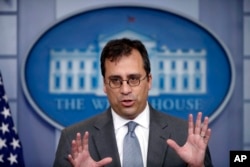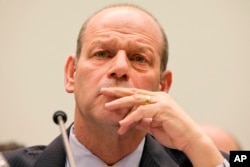The U.S. immigration agency plans to significantly reduce its presence abroad, according to an internal e-mail seen by Reuters and current and former U.S. officials, in an effort to shift resources to domestic offices that took some career officials by surprise.
U.S. Citizenship and Immigration Services (USCIS), which operates under the Department of Homeland Security, currently operates 23 offices overseas, scattered across Latin America, Europe and Asia, according to the agency's website.
The move comes as the Trump administration has worked in the past two years to limit both legal and illegal immigration with cuts to the U.S. refugee program and USCIS stepping up vetting of visa applications.
The USCIS offices carry out a number of services, including helping Americans who want to bring relatives to the United States, processing refugee applications, enabling overseas citizenship applications and assisting U.S. citizens who want to adopt foreign children, the website says. USCIS officers abroad also look for fraud in visa applications and provide technical immigration advice to other U.S. government officials.
On Monday, senior USCIS officials told employees within the agency's Refugee Asylum and International Operations division that the agency had decided to close its overseas posts, one current and one former official said. The closures will happen over the next year and some of the offices' tasks likely will be shifted to the State Department, said the officials, who spoke on condition of anonymity because they were not authorized to speak publicly.
USCIS Director Francis Cissna sent a message on Tuesday to all agency employees saying the agency is preparing for discussions that would lead to shifting much of its international workload to its U.S. offices for domestic processing, as well as to U.S. embassies and consulates abroad.
"Change can be difficult and can cause consternation," Cissna wrote, but he said that the agency was committed to implementing "as smooth a transition as possible."
In places where USCIS does not have overseas posts, the State Department already carries out some of its duties, such as replacing green cards for American permanent residents who have lost theirs.
"As we have internally shared, USCIS is in preliminary discussions to consider shifting its international USCIS office workloads to USCIS domestic offices in the United States and, where practicable, to U.S. embassies and consulates abroad," agency spokeswoman Jessica Collins said in an e-mail to Reuters.
"The goal of any such shift would be to maximize USCIS resources that could then be reallocated, in part, to backlog reduction efforts," she said.
The agency would work closely with the State Department and the Department of Homeland Security "to ensure no interruption in the provision of immigration services to affected applicants and petitioners," Collins said.
One of the responsibilities of the overseas offices is to help process refugee applications. But the Trump administration's reduction of refugee admissions has reduced that part of the offices' workload.
The administration also has put in place new barriers for asylum seekers, barring citizens of several Muslim-majority countries from traveling to the United States, and pushing new rules that would make it harder for low-income people to become permanent American residents.
USCIS has in the past decided to close individual offices based on demand for its services. The agency previously announced that its Moscow field office will permanently close at the end of March, citing a "significant decrease in workload."
But the closure of all overseas USCIS offices represent a shift in the agency's operations and came as a surprise to some employees.
Leon Rodriguez, the former USCIS director during the Obama administration, said the shift may have been aimed at cutting costs.
"Symbolically it is retreating from an international presence," Rodriguez said. “That's the message we have been sending."
However, he said, "There is nothing that will go undone. There are certain things that will now be able to do in the U.S. and other things that will now be delegated out the consulates."








